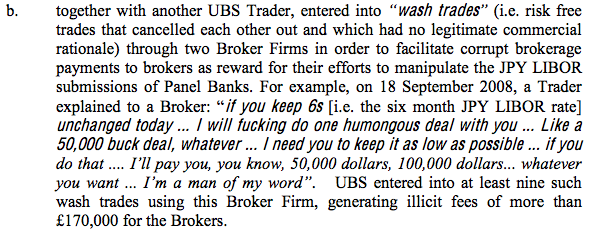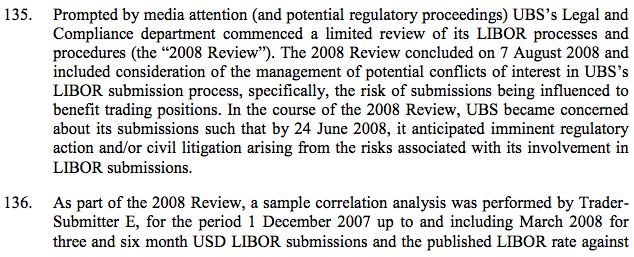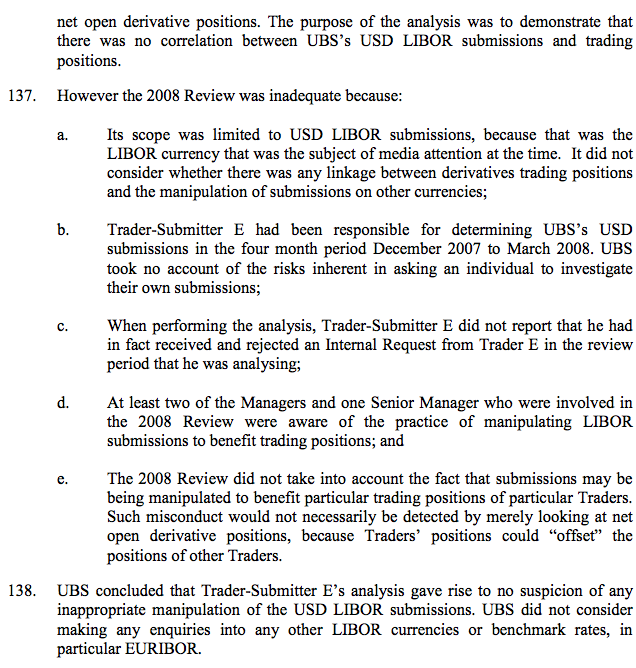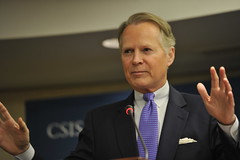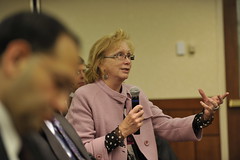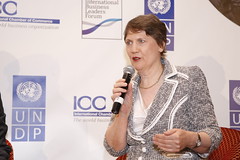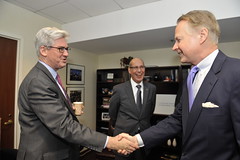If you’ve been following the story of the official response to Occupy Wall Street, it was apparent that the 17 city paramilitary crackdown was coordinated; it came out later that the Department of Homeland Security was the nexus of that operation. The deep FBI involvement is a new and ugly addition to this picture. Several impressions emerge from reading the summaries and dipping into the FBI documents:
The FBI deemed OWS to be a terrorist organization and went into “guilty until proven innocent” mode. Many of the FBI descriptions of possible OWS actions or those of affiliated organizations like Adbusters consistently look to have taken the most inflammatory snippets and presented them out of context.The Federal Reserve in Richmond appears to have had personnel surveilling OWS planning. They were in contact with the FBI in Richmond to “pass on information regarding the movement known as occupy Wall Street.” There were repeated communications “to pass on updates of the events and decisions made during the small rallies and the following information received from the Capital Police Intelligence Unit through JTTF (Joint Terrorism Task Force).”…
The FBI also seems to believe that there is no such thing as peaceful protest, that any non-violent activity has the potential to turn violent and therefore should be treated as violent. One document to corporate “clients” warned:Even seemingly peaceful rallies can spur violent activity or be met with resistance by security forces. Bystanders may be arrested or harmed by security forces using water cannons, tear gas or other measures to control crowds.The banks were deeply involved in the effort to put down OWS. The executive director of the PCJ stated, “These documents also show these federal agencies functioning as a de facto intelligence arm of Wall Street and Corporate America.” Naomi Wolf adds:The documents, released after long delay in the week between Christmas and New Year, show a nationwide meta-plot unfolding in city after city in an Orwellian world: six American universities are sites where campus police funneled information about students involved with OWS to the FBI, with the administrations’ knowledge (p51); banks sat down with FBI officials to pool information about OWS protesters harvested by private security; plans to crush Occupy events, planned for a month down the road, were made by the FBI – and offered to the representatives of the same organizations that the protests would target; and even threats of the assassination of OWS leaders by sniper fire – by whom? Where? – now remain redacted and undisclosed to those American citizens in danger, contrary to standard FBI practice to inform the person concerned when there is a threat against a political leader (p61).More details from the PCJ summary:As early as August 19, 2011, the FBI in New York was meeting with the New York Stock Exchange to discuss the Occupy Wall Street protests that wouldn’t start for another month. By September, prior to the start of the OWS, the FBI was notifying businesses that they might be the focus of an OWS protest…
Documents released show coordination between the FBI, Department of Homeland Security and corporate America. They include a report by the Domestic Security Alliance Council (DSAC), described by the federal government as “a strategic partnership between the FBI, the Department of Homeland Security and the private sector.” The DSAC report shows the nature of secret collaboration between American intelligence agencies and their corporate clients – the document contains a “handling notice” that the information is “meant for use primarily within the corporate security community. Such messages shall not be released in either written or oral form to the media, the general public or other personnel…”….DSAC issued several tips to its corporate clients on “civil unrest” which it defines as ranging from “small, organized rallies to large-scale demonstrations and rioting.”…
The rationale for this overkill was that OWS was a terrorist threat. That’s a striking contrast with the media depiction of the movement when it was in its encampment phase as a bunch of directionless hippies with no message. But the FBI response highlights how anything other than corporate or otherwise officially sanctioned assembly is no longer permitted in America. The main objection to OWS really isn’t violence, even though that serves as the excuse for the official crackdown. It was that it would be inconvenient and embarrassing to Important Organizations and People. Now I have to tell you as a resident of New York City, we are subject to inconvenient things on a regular basis. I’d have a lot less reason to take exception to the eviction of OWS if the officialdom was evenhanded about making the city efficient and keeping the streets clear by getting rid of (for starters) all parades, all street fairs, the marathon, and all Presidential visits (well maybe he can make a minimally invasive stop, say by going down the FDR to the UN and staying in those environs).The Jackson, Mississippi division of the FBI attended a meeting of the Bank Security Group in Biloxi, MS with multiple private banks and the Biloxi Police Department, in which they discussed an announced protest for “National Bad Bank Sit-In-Day” on December 7, 2011.As a result, many of the perceptions of threats were paranoid. The FBI’s search forCommunists in woodpilesOccupiers in midsized and small cities is obvious ovekill. And mind you, this is the same FBI that is nowhere to be found in investigating crisis-related big bank fraud. An individual “leading” Occupy Tampa was tracked when he went to Gainesville. Anchorage, Alaska, Denver, Colorado, Birmingham, Alabama, Jackson, Mississippi, Memphis, Tennessee, and Green Bay, Wisconsin all had Occupy-related briefings and FBI activity.
Wolf draws the ugly conclusion:
Jason Leopold, at Truthout.org, who has sought similar documents for more than a year, reported that the FBI falsely asserted in response to his own FOIA requests that no documents related to its infiltration of Occupy Wall Street existed at all. But the release may be strategic: if you are an Occupy activist and see how your information is being sent to terrorism task forces and fusion centers, not to mention the “longterm plans” of some redacted group to shoot you, this document is quite the deterrent.There is a new twist: the merger of the private sector, DHS and the FBI means that any of us can become WikiLeaks, a point that Julian Assange was trying to make in explaining the argument behind his recent book. The fusion of the tracking of money and the suppression of dissent means that a huge area of vulnerability in civil society – people’s income streams and financial records – is now firmly in the hands of the banks, which are, in turn, now in the business of tracking your dissent.
Assange has suggested a partial solution: the widespread use of encryption. The problem with using encryption now is that it’s like waving a red flag in front of the NSA and asking them to take interest in you. But if a meaningful percentage of the population, say as many as 3%, were to start using it for most of their communications as part of a large-scale plan, it would throw a wrench into the system. The officialdom would be presented with an unduly large list of parties of interest, most of whom by design would be uninteresting from a threat/intelligence perspective. And if this sort of thing were to take place, anyone who thought they might be objects of interest for the wrong reasons, as in they were members of Occupy, could also take up encrypting their messages for fun and sport.
The peculiar part of this overreaction is it says that banks and government officials see peaceful protests as a threat to their hold on power. It’s odd that they see their position as precarious, unless they have convinced themselves of their vulnerability as an excuse for clamping down even harder on the rest of us.
Source








